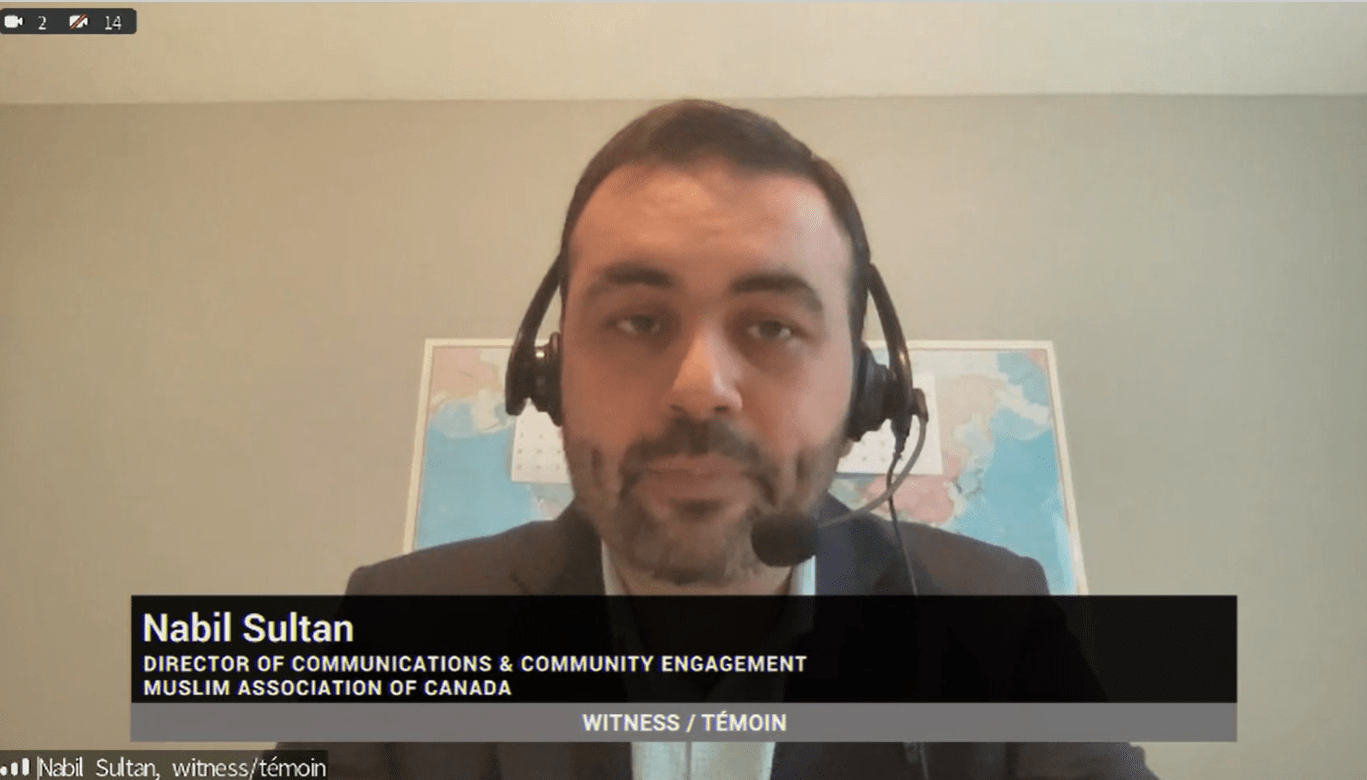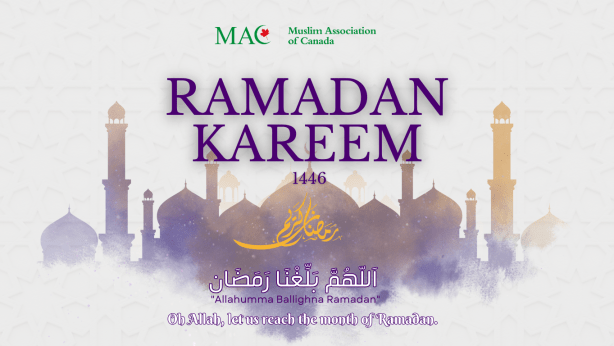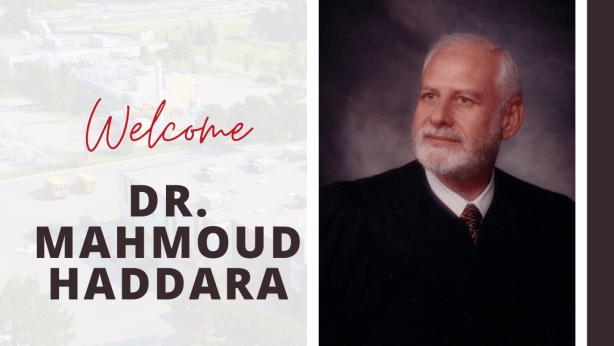The Standing Senate Committee On Human Rights – Testimony By Dr. Nabil Sultan on behalf of MAC

THE STANDING SENATE COMMITTEE ON HUMAN RIGHTS
OTTAWA, Monday, November 21, 2022
Nabil Sultan, Director of Communications & Community Engagement, Muslim Association of Canada: Thank you for inviting me to testify today. My name is Nabil Sultan. I am an educator and a physician. I serve as the Director of Communications & Community Engagement for the Muslim Association of Canada. I was also the former chair of the board of MAC. MAC’s mission is to promote a moderate, balanced view of Islam in Canada and to educate and motivate Canadian Muslims to put their faith into action for the benefit of all Canadians. MAC understands Islam to be a comprehensive way of life that emphasizes not just belief but also, importantly, service to humanity. MAC currently has over 1,000 employees, several thousand volunteers and serves more than 150,000 members of the Canadian Muslim community with chapters in 14 cities across the country. MAC also operates 22 mosques and community centres and has 30 schools.
MAC is recognized as a leader in Islamic affairs in Canada representing a significant segment of the Canadian Muslim community’s understanding of Islam. Muslim charities have been targeted by the CRA. Independent reports from the Institute of Islamic Studies and the International Civil Liberties Monitoring Group confirm the community’s concerns about discrimination and Islamophobia.
The Prime Minister affirmed the issue at the National Summit on Islamophobia and the ombudsperson is investigating the agency’s practices.
Despite its good work, MAC is currently at risk of having its charitable status revoked by the Review and Analysis Division, RAD, in the CRA. Like many other Muslim charities, the CRA is applying standards to MAC that it does not apply to other faith-based organizations.
MAC acknowledges that the CRA has the right to audit organizations and that MAC, like any other charity, must comply with the Income Tax Act. But subjecting MAC to different standards than other charities, other faith charities, simply because MAC is a Muslim organization is discriminatory and contrary to the fundamental principles of Canadian democracy and our Charter of Rights and Freedoms.
Today I will discuss the experience of MAC, which is indicative of other Muslim charities. In 2015, the Toronto Sun published Islamophobic articles claiming that MAC was mentioned in an RCMP INSET investigation and that MAC had ties to terrorism. These articles were false, misleading and possibly politically motivated. At the time, MAC denied these allegations but had no recourse as the RCMP would not confirm or deny the allegations.
Soon after this, the CRA initiated an audit of MAC. The audit was not random or routine, it was triggered by these articles and commenced with the specific purpose of investigating possible ties to terrorism or terrorist financing. The audit was conducted by the Review and Analysis Division, RAD, a specialized unit that investigates terrorism financing within the CRA. RAD was on site for that audit for approximately 13 months and conducted interviews and reviewed over 400,000 MAC emails, 1 million financial transactions and over 60,000 additional files.
According to MAC’s lawyers, who have extensive experience with charity audits, this audit was far more extensive than any other audit they’ve witnessed. In the end, as expected, RAD did not find any evidence that MAC is supporting or financing terrorism or extremism of any kind.
In 2020, the Muslim Association of Canada, MAC, contacted the RCMP Commissioner Brenda Lucki to seek an explanation for the Toronto Sun articles. MAC received a letter from her confirming that there is no wrongdoing on the part of MAC. Shortly after that, Postmedia retracted the Toronto Sun articles, because they could not be substantiated.
In 2021, the CRA’s Review and Analysis Division, RAD, issued its Administrative Fairness Letter that heavily relied on these now retracted articles as well as a large number of discredited and Islamophobic articles. One of them is Thomas Quiggin, who has published misinformation alleging widespread links between Muslim organizations and terrorism. He is the subject of several defamation lawsuits and was one of the Freedom Convoy organizers. Imagine if the CRA were to audit a Jewish organization and rely on sources written by individuals known for their anti-Semitism; yet, the CRA finds it acceptable conduct in the case of Muslim charities.
There are many examples of Islamophobia in this audit, but one of the clearest examples is that it arbitrarily alleges that several MAC activities are social rather than religious and, therefore, its charitable status should be revoked. For instance, the CRA claims that MAC’s Eid festivals are inadequately religious, because they involve social elements such as carnivals for children, bazaars and food sales. It is difficult to imagine the CRA applying the same standard of not sufficiently religious to a Christmas party put on by a church, a Passover celebration held at a synagogue, or a Diwali celebration held at a Hindu temple. Accepting the CRA and RAD’s self-appointed status as interpreters of Islam should not be allowed. It is for these reasons that MAC has launched a Charter challenge in the Ontario Superior Court that alleges both systemic Islamophobia in CRA practices and the specific infringement of MAC’s Charter rights by the CRA audit.
The AFL or Administrative Fairness Letter CRA claims to delegitimize important charitable activities in Canada to advance religion through unsubstantiated allegations are based on bias and Islamophobic prejudice. This has been the experience of many Muslim charities audited by the CRA. The CRA’s prejudiced approach does not serve the public interest; rather, it both relies upon and feeds into extremist Islamophobic narratives. For many Muslim charities, when the CRA has not been able to identify findings of terrorism, it instead revokes and sanctions Muslim charities based upon technical faults that could be addressed without sanction if Muslim charities were given a fair opportunity to the education-first approach that the CRA states is its general policy and which it offers to other charities.
These discriminatory practices by the CRA against Muslim charities have had a devastating impact on the services and programs upon which tens of thousands of Canadian Muslims and other beneficiaries rely. Muslim charities have been forced to divert significant human and financial resources from serving their communities to defending themselves against these practices. They have had a chilling effect on the Muslim community, making Muslims wary of supporting Muslim charities and seeking their services, further disenfranchising a community already impacted by Islamophobia.
If allowed to continue, the Government of Canada is signalling that systemic Islamophobia bias is tolerated within its agencies. It encourages Islamophobia outside of government and undermines the efforts of all who promote tolerance.
Thank you.
The Chair: Thank you very much to both the witnesses.
Senator Omidvar: Mr. Sultan, I’m pretty much in the weeds on the charities file, and I appreciate your testimony. Can you tell us what the status is of your Charter challenge?
Mr. Sultan: It’s still in the court system, and we are awaiting a determination, we expect, in late spring or early summer from the Ontario Superior Court.
Senator Omidvar: Do you know that the government has appointed a tax ombudsman partly as a result of the Islamophobia summit? The tax ombudsman is appearing today before us and has launched an investigation around the claims of Islamophobia in the CRA.
To what extent were you consulted as part of this investigation?
Mr. Sultan: I think MAC as an organization was consulted about that, but I know that there has been a feeling in the community that there hasn’t been sufficient consultation. Also there are members of the community that have been wary of engaging in consultation.
The situation at the moment in the Muslim community is that there is a lack of trust with government bureaucracies because of the Islamophobia people have witnessed. There is a hesitancy to fully engage. I can’t speak to how wide the act of consultation has been, but MAC has been approached.
Senator Omidvar: I see. You said that there are different standards applied by the CRA to Muslim charities. When I have raised this matter with CRA officials, they have said to me that they do not look at charities, reviews or audits, based on religion. They couldn’t tell me if Hindu or Jewish organizations had been audited because that’s not the information they gather. What would you say to that?
Mr. Sultan: I would say that it’s a very simple process to try to understand the systemic discrimination that exists. One simple way to do it is to ask how many Muslim charities have been audited under the Review and Analysis Division versus Christian, Jewish, Hindu, et cetera. I think that would be very telling. When you get audited under RAD, it is a very different type of audit than a regular CRA audit. RAD was set up to investigate terrorism financing. Out of all of the Muslim charities that have been audited by RAD, I am not aware of any criminally implicated individuals in those audits. So you get put through these RAD audits, there is no criminal allegations that stick to individuals, but the organizations are either shut down or penalized and crippled to do their work.
This is part of the challenge, I think. We don’t have that information, and the CRA can make claims that are very hard to determine from the outside because we don’t have access to that information. That’s why the community is hoping that the government will act and get to the bottom of this discrimination and bias that definitely exists and remedy it.
Senator Omidvar: I have questions for both of you. Mr. Sultan, as you can well appreciate, good policy rests on solid evidence, and right now, the CRA does not collect data based on religion. We know how many religious charities there are in Canada. We don’t know how many are this religion or that religion. So it’s very hard to compare.
Would you recommend that the CRA start gathering data on religious charities based on registration, audits and revocation so we finally have some evidence so that we can compare apples with apples with apples?
Mr. Sultan: Absolutely. One data point that I forgot to mention is actually a data point mentioned in the University of Toronto report on CRA practices. That report showed that while Muslim charities represented less than 1% of all Canadian charities, they represented 75% of all revoked charities by the Review and Analysis Division, or RAD. So we have that piece of information. But absolutely, just as law enforcement agencies are asked to present race-based data, the CRA needs to be able to produce religious data. It should be able to provide the different data about the different demographics, the different types of charities it audits and the different consequences of those audits. The public should know who gets audited by the RAD division and who gets audited by the regular CRA division as well as what types of charities and how they are being treated.
Absolutely. I think that is an important part of reform that will help keep transparency moving forward and let the public and the government know what is going on.
Senator Omidvar: So would it be sort of a proxy of what we normally call disaggregated data, but in this case, it would be disaggregated data by religion?
Mr. Sultan: That’s right.
The Chair: Mr. Sultan, I have a brief question for you. We will be hearing from the CRA at some point. What would be the one question you would ask them?
Mr. Sultan: I would ask them is what systems they have in place to ensure that there is no systemic discrimination against Muslims or other minorities.
The Chair: Going back to Senator Omidvar’s question — the two of us had a meeting with the CRA and I raised the issue that out of the eight charities that were audited, six of them were Muslim. They said they don’t specifically audit Muslim charities. I raised the issue that if they know that there’s a charity that’s working in a Muslim country or has “Islamic” in its name, you know it’s a Muslim charity.
Mr. Sultan: Yes, of course. I think it’s a bit disingenuous to make the claim that we don’t have any explicit criteria to audit Muslim charities, yet the reality on the ground is that the processes that lead to triggering an audit by the RAD division especially are completely biased against Muslim organizations and charities. That has roots in Islamophobia, in Islamophobic media, in Islamophobic politicians of the past that instilled these programs with that direction in mind. Unless we are ready to call a spade a spade, the Muslim community will continue to face this discrimination. Instead of Muslim charities serving the communities across this country, they will spend extensive human and financial resources to defend themselves against these biases and this discrimination.
It’s really unfair, because you have a community that is already disenfranchised, that is already dealing with systemic Islamophobia in broader society and now has to face it within government bureaucracies. It’s a double burden that is unfair for the Muslim community, and I don’t think the CRA is taking any leadership in identifying this and committing to addressing it.
All I have heard from the CRA, whether through the media or any other means, is denial. It’s really unfortunate that you have such clear evidence, several reports, the practices are very obvious, and there’s no awareness or commitment to do better. Our Prime Minister talked about this importance and that this is a real issue that needs to be addressed. So where is the CRA’s leadership on this? Where is their own self-reflection and their own assessments? I think that if we’re not seeing that leadership from the CRA, it again means that the government has that responsibility to act and instill reform.The Chair: Thank you very much. I would like to sincerely thank the witnesses for agreeing to participate in this important study. Your assistance to our study is greatly appreciated.


